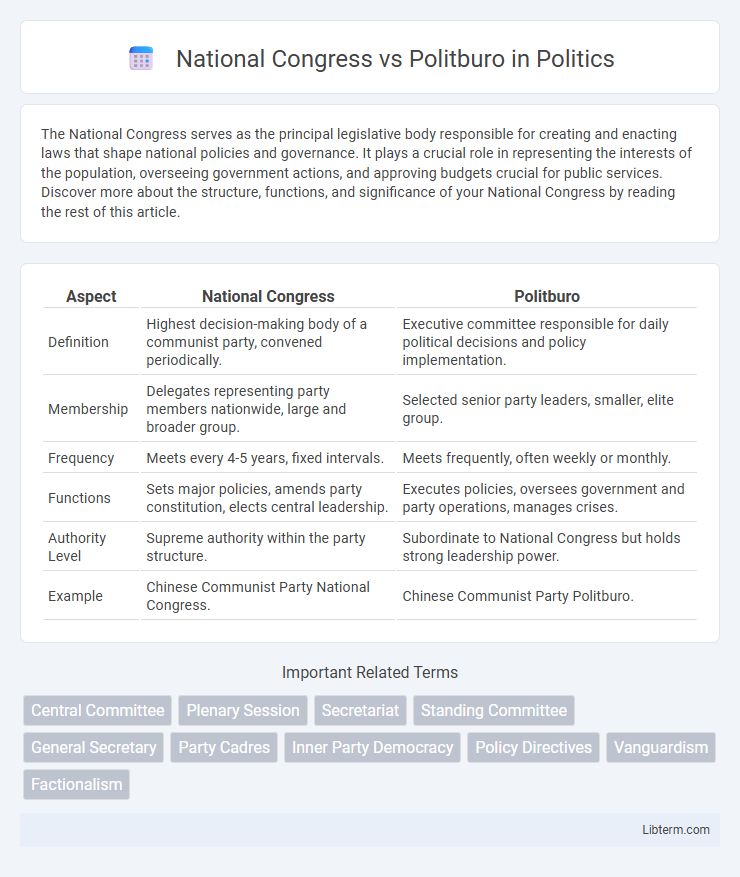The National Congress serves as the principal legislative body responsible for creating and enacting laws that shape national policies and governance. It plays a crucial role in representing the interests of the population, overseeing government actions, and approving budgets crucial for public services. Discover more about the structure, functions, and significance of your National Congress by reading the rest of this article.
Table of Comparison
| Aspect | National Congress | Politburo |
|---|---|---|
| Definition | Highest decision-making body of a communist party, convened periodically. | Executive committee responsible for daily political decisions and policy implementation. |
| Membership | Delegates representing party members nationwide, large and broader group. | Selected senior party leaders, smaller, elite group. |
| Frequency | Meets every 4-5 years, fixed intervals. | Meets frequently, often weekly or monthly. |
| Functions | Sets major policies, amends party constitution, elects central leadership. | Executes policies, oversees government and party operations, manages crises. |
| Authority Level | Supreme authority within the party structure. | Subordinate to National Congress but holds strong leadership power. |
| Example | Chinese Communist Party National Congress. | Chinese Communist Party Politburo. |
Overview: National Congress and Politburo Defined
The National Congress serves as the highest decision-making body, representing party members and setting major policies within the organization. The Politburo, elected by the National Congress, functions as the executive committee responsible for implementing policies and overseeing daily party activities. Both structures maintain centralized control but operate at different levels of authority and responsibility within the party hierarchy.
Historical Evolution of Both Bodies
The National Congress and the Politburo have evolved as central components of China's Communist Party governance, with the National Congress established in 1921 as the supreme party assembly responsible for setting policies and electing the central leadership. The Politburo, formalized in the 1920s, grew in authority to become the executive committee directing daily operations between National Congress sessions. Over time, the Politburo's influence expanded, especially after the 1945 Party Constitution reforms, consolidating power at the top and shaping the systemic governance framework within the Communist Party.
Organizational Structure: Comparing Power Hierarchies
The National Congress serves as the highest decision-making body within the party, convening every five years to elect the Central Committee and set major policies. The Politburo, selected by the Central Committee, functions as the core executive committee, wielding concentrated power over daily governance and strategic direction. This hierarchical structure positions the National Congress as the supreme authority in policy-making, while the Politburo implements and enforces decisions with streamlined, centralized control.
Key Functions and Responsibilities
The National Congress serves as the supreme decision-making body responsible for setting the overall direction, electing the Central Committee, and approving major policies and amendments. The Politburo, elected by the Central Committee, handles day-to-day political decisions, supervises policy implementation, and guides party activities between National Congress sessions. The National Congress holds authority over broad strategic agendas, while the Politburo executes specific governance and leadership tasks within the party structure.
Membership Selection and Composition
The National Congress is a large assembly composed of thousands of delegates selected from various party organizations across the country, reflecting a broad representation of regional and sectoral interests. In contrast, the Politburo consists of a small group of top-ranking party officials elected by the Central Committee, emphasizing concentrated leadership and decision-making authority. Membership in the Politburo typically includes senior party leaders with significant influence and experience, whereas the National Congress includes a wider range of members representing diverse party constituencies.
Decision-Making Processes
The National Congress serves as the highest authority in the party, convening every five years to set broad policies and elect the Central Committee. The Politburo, a smaller executive body elected by the Central Committee, handles day-to-day decision-making and implements the National Congress's directives between sessions. This hierarchical structure ensures strategic guidance from the National Congress is operationalized efficiently through the Politburo's ongoing governance.
Influence on Party Policy and Governance
The National Congress serves as the highest decision-making body in the party, responsible for approving major policy directions and electing the Politburo. The Politburo, consisting of top party leaders, wields substantial influence over day-to-day governance and policy implementation, effectively shaping party strategies between National Congress sessions. This dynamic positions the National Congress as a foundational authority, while the Politburo operates as the executive core driving policy execution and political governance.
Role in Leadership Transitions
The National Congress serves as the supreme decision-making body that elects the Politburo, playing a crucial role in leadership transitions by endorsing major policy directions and appointing key officials. The Politburo, composed of top party leaders selected by the National Congress, oversees the implementation of these policies and manages day-to-day governance, ensuring continuity and stability during leadership changes. This structured relationship between the National Congress and the Politburo enables coordinated leadership succession and strategic political direction within the party.
Accountability and Transparency Mechanisms
The National Congress serves as the supreme decision-making body with broad representation, enabling higher accountability through periodic, large-scale meetings and delegate elections. The Politburo operates as a smaller executive committee, focusing on day-to-day governance, often with less direct transparency due to limited public scrutiny and closed sessions. Mechanisms such as party congress reports, internal audits, and disciplinary inspections aim to enhance transparency and accountability within both structures, though effectiveness varies by political context.
Impact on National and International Politics
The National Congress of the Communist Party of China sets broad policy directions and elects the Politburo, shaping national governance frameworks and influencing China's domestic stability. The Politburo, as the core executive decision-making body, implements strategic initiatives that drive China's economic reforms and assert its stance in international diplomacy. This dynamic between the Congress and Politburo significantly affects China's global power projection and internal political cohesion.
National Congress Infographic

 libterm.com
libterm.com